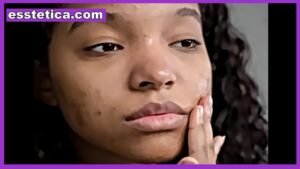Understanding Acne During Pregnancy: Why Breakouts Happen
Pregnancy can bring unexpected changes to your skin—acne being one of the most common. Even women who have never struggled with blemishes may notice breakouts during this time. The culprit? Dramatic shifts in hormone levels that affect the skin in multiple ways.
1. Hormonal Surge: Progesterone and Androgens Take the Spotlight
The primary driver of pregnancy acne is the sudden spike in reproductive hormones, especially progesterone and androgens (such as testosterone). These fluctuations are vital for sustaining the pregnancy, but they can wreak havoc on your skin.
How It Happens:
-
Increased Sebum Production: Elevated hormone levels stimulate the sebaceous glands—tiny oil factories in your skin—to produce sebum at a much higher rate than usual.
-
Clogged Pores: When excess sebum mixes with dead skin cells, it can easily block pores. These clogged pores create a fertile ground for acne-causing bacteria to thrive, resulting in whiteheads, blackheads, inflamed pimples, or even cysts.
2. Timing: When Pregnancy Acne Peaks
Acne flare-ups often coincide with specific phases of pregnancy:
-
First Trimester: Breakouts are most common here, as the hormonal surge is at its steepest. Many women experience the first noticeable flare during this period.
-
Third Trimester: For some, acne resurfaces later in pregnancy, as sebaceous glands can reach maximum activity and the skin’s oil production continues to rise.
3. Additional Triggers
While hormones are the main culprit, several other factors can influence acne during pregnancy:
-
Genetics: A history of teenage acne or premenstrual breakouts can increase the likelihood of pregnancy acne.
-
Stress: Emotional and physical stress may exacerbate hormonal fluctuations, triggering new blemishes.
-
Immune System Changes: Pregnancy alters your immune system, which can affect the skin’s natural defenses against bacteria, making it more prone to inflammation and infection.

4. Safe Treatment Considerations
Because many conventional acne treatments—oral retinoids, topical retinoids, high-dose salicylic acid, and benzoyl peroxide—are not safe during pregnancy, it’s crucial to consult your obstetrician or dermatologist before trying any acne products.
Bottom Line:
Pregnancy acne is largely hormone-driven, but a combination of genetics, stress, and immune changes can influence severity. With careful attention and the right guidance, breakouts can be managed safely while protecting both mother and baby.
Pregnancy-Safe Acne Treatments: Protecting Your Skin and Baby
Managing acne during pregnancy requires extra caution. Many common over-the-counter and prescription ingredients can pose risks to the developing baby. Never start a new skincare regimen without consulting your obstetrician or dermatologist. Safety comes first—but that doesn’t mean you have to endure persistent breakouts.
1. The Safest Topical Ingredients
These ingredients are widely considered safe and effective for pregnant and breastfeeding mothers. They help fight acne, reduce inflammation, and prevent scarring while minimizing risk to your baby.
| Ingredient | Use & Efficacy | Safety Notes |
|---|---|---|
| Azelaic Acid | Anti-inflammatory, antibacterial, reduces post-acne hyperpigmentation. | Safe throughout pregnancy and breastfeeding. Available OTC and in prescription formulations. |
| Glycolic Acid (AHA) | Gentle exfoliant that removes dead skin cells, prevents clogged pores, and improves texture. | Safe in low concentrations found in most OTC products and some mild chemical peels. |
| Benzoyl Peroxide | Kills acne-causing bacteria and helps shed dead skin cells. | Safe in low concentrations (≤5%). Minimal absorption, but use sparingly and under medical guidance. |
| Salicylic Acid (BHA) | Mild exfoliant that penetrates oil and unclogs pores. | Safe in low concentrations (≤2%) in wash-off cleansers or spot treatments. Avoid high-concentration peels or oral forms. |
| Niacinamide (Vitamin B3) | Reduces redness, inflammation, and oiliness; strengthens the skin barrier. | Safe and highly effective for calming breakouts. |
| Topical Antibiotics (Clindamycin, Erythromycin) | Target acne-causing bacteria. | Safe in topical form due to minimal absorption. Often used short-term or combined with other safe treatments. |
2. General Skincare Practices for Expecting Mothers
Adopting gentle, consistent habits can significantly reduce breakouts and protect sensitive pregnancy skin:
-
Gentle Cleansing: Wash your face twice daily with a mild, non-comedogenic cleanser using lukewarm water. Avoid harsh scrubs that can worsen inflammation.
-
Non-Comedogenic Products: Select makeup, moisturizers, and sunscreens labeled “oil-free” or “non-comedogenic” to prevent clogged pores.
-
Hands Off: Picking, popping, or squeezing blemishes spreads bacteria, increases inflammation, and can lead to permanent scarring.
-
Daily Sun Protection: Use mineral-based sunscreen with zinc oxide or titanium dioxide. Pregnancy hormones make your skin more prone to sun-induced pigmentation like melasma or chloasma.
3. Ingredients to Strictly Avoid
Some acne treatments carry significant risk and should never be used during pregnancy:
| Ingredient | Reason for Avoidance |
|---|---|
| Oral Isotretinoin (Accutane, Roaccutane, etc.) | Highly teratogenic; can cause severe birth defects. Absolutely forbidden. |
| Topical Retinoids (Tretinoin, Adapalene, Tazarotene, Retinol) | Potential birth defect risk, especially with prescription strength. Best avoided entirely. |
| Oral Tetracyclines (Doxycycline, Minocycline) | May discolor the baby’s teeth and impair bone development. |
| Spironolactone | Oral medication for hormonal acne; can affect fetal development. |
Important: Always review your full product list and discuss any new symptoms with your healthcare provider. Together, you can create a safe, effective acne plan tailored to both your skin and your baby’s well-being.
🏆 Struggling with acne? Discover the 2 natural solutions I personally recommend:
👉Get Ninja Health Now — Launch Your Health Site in 60 Seconds
YOU MAY ALSO LIKE:
Natural Remedies for Pregnancy Acne: Safe Ways to Soothe Hormonal Breakouts






